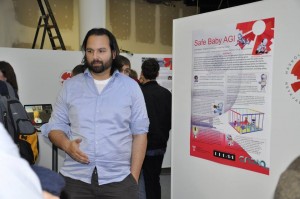
Today Jordi Bieger will defend his PhD Thesis Proposal on Artificial Pedagogy. The defence is open to the public and will take place at 12 noon in M111 at Reykjavík University.
Abstract: General intelligence is the ability to perform complex new tasks in a wide range of large and dynamic environments. The knowledge to perform these tasks must be learned throughout an entire lifetime as situations change. Learning complex new things from scratch is virtually intractable without guidance and often requires sophisticated teaching. The goal of the proposed work is to study “artificial pedagogy” (AP): the systematization and theory of teaching artificial learners. Key aspects of the theory include a framework of teaching methods and their applicability, a characterization of learners and task-environments in terms of properties that are relevant to teaching, and a way to evaluate learners and teachers. Most importantly, this theory aims to provide a deeper understanding and systematic approach to teaching that enables artificial learners to develop more of their potential using less resources.
Bio: Jordi Bieger is a PhD student in the Center for Analysis and Design of Intelligent Agents at Reykjavík University. He is originally from the Netherlands where he received a bachelor’s and master’s degree in Artificial Intelligence from the Radboud University in Nijmegen. He came to Iceland in the Spring of 2013 to pursue his dream of studying artificial general intelligence. Before starting his PhD in the Fall under the supervision of Dr. Kristinn R. Thórisson, Jordi briefly worked at the Icelandic Institute for Intelligent Machines. Jordi was involved in the organisation of the last conference on artificial general intelligence (AGI-15) as co-chair of the program committee.
Title: Artificial Pedagogy
PhD student: Jordi Bieger
Supervisor: Kristinn R. Thórisson
Committee: Pei Wang, Marjan Sirjani, Eric Nivel
When and where: Room M111 at 12:00 on the 29th of October
